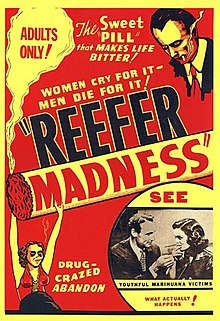| Reefer Madness | |
|---|---|
 1972 theatrical release poster | |
| Directed by | Louis J. Gasnier |
| Screenplay by | Arthur Hoerl |
| Story by | Lawrence Meade |
| Produced by |
|
| Starring |
|
| Cinematography | Jack Greenhalgh |
| Edited by | Carl Pierson |
| Music by | Abe Meyer |
Production company | G&H Productions |
| Distributed by | Motion Picture Ventures |
Release date |
|
Running time | 68 minutes |
| Country | United States |
| Language | English |
| Budget | $100,000 (about $2,175,000 in 2024) |
| Box office | $1,443,000 (1970 reissue)[1] |
Reefer Madness (originally made as Tell Your Children and sometimes titled The Burning Question, Dope Addict, Doped Youth, and Love Madness) is a 1936 American exploitation film about drugs, revolving around the melodramatic events that ensue when high school students are lured by pushers to try marijuana – upon trying it, they become addicted, eventually leading them to become involved in various crimes such as a hit and run accident, manslaughter, murder, conspiracy to murder and attempted rape. While all this is happening, they suffer hallucinations, descend into insanity, associate with organized crime and (in one character's case) commit suicide. The film was directed by Louis J. Gasnier and featured a cast of mainly little-known actors.
Originally financed by a church group under the title Tell Your Children, the film was intended to be shown to parents as a morality tale attempting to teach them about the dangers of cannabis use.[2] Soon after the film was shot, it was purchased by producer Dwain Esper, who re-cut the film for distribution on the exploitation film circuit, exploiting vulgar interest while escaping censorship under the guise of moral guidance, beginning in 1938–1939 through the 1940s and 1950s.[2]
The film was "rediscovered" in the early 1970s and gained new life as an unintentional satire among advocates of cannabis policy reform.[2][3] Critics have called it one of the worst films ever made, and it has gained a cult following within cannabis culture.[4][5] Today, it is in the public domain in the United States.[3]
- ^ Donahue, Suzanne Mary (1987). American film distribution : the changing marketplace. UMI Research Press. p. 296. ISBN 9780835717762. Please note figures are for rentals in US and Canada
- ^ a b c Cite error: The named reference
Historywas invoked but never defined (see the help page). - ^ a b Peary, Danny (1981). Cult Movies. New York: Delacorte Press. pp. 203–205. ISBN 0440016266.
- ^ "Reefer Madness (1936)". AMC (TV channel). Archived from the original on December 4, 2014. Retrieved November 17, 2013.
- ^ Stemme, Joe (September 4, 2005). "What's the Worst Movie Ever?". Los Angeles Times. Retrieved November 17, 2013.